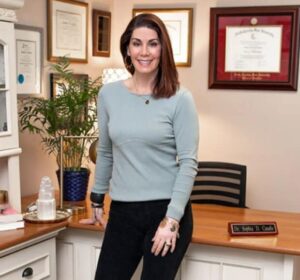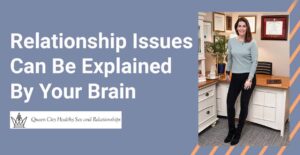The Short Version: Dr. Sophia Dorton Caudle, a psychotherapist based in North Carolina, has made a career out of diving into people’s heads. She specializes in sex therapy and addiction for all ages. Dr. Sophia gave us some insight into how relationship issues can be traced back to our childhoods, and how we can heal from deeply ingrained bad habits.
The mind is a mysterious place. I can barely explain what goes on in my own head, let alone what goes through someone else’s. Sometimes, my closest loved ones make decisions that simply baffle me. What were they thinking?! What was I thinking?! And while we’re on the subject, how much do our psyches factor into our romantic relationships, anyway?
Most of us run from oncoming conflict, but Dr. Sophia Dorton Caudle of Queen City Healthy Sex and Relationships meets relationship problems head-on. If someone comes to her with a problem of the heart, head, or both, she’s all in — because they’re usually connected.
“I have a strong interest in intimacy and relationships,” she told us. “In my practices, we focus on sex therapy, sex addiction, trauma, grief, mood disorders, and codependency.” But really, Dr. Sophia is passionate about getting to the root cause of any relationship-related problem a couple may be experiencing.
If you want to know a person’s heart, you may have to explore your own brain first, said Dr. Sophia.
Adult Relationship Patterns Are Shaped By Your Past
TV therapists tend to nod, jot down notes, and ask “How does that make you feel?” Expect a more exploratory approach from Dr. Sophia. “We are root cause therapists,” she said of her psychotherapy practices. Root cause therapy is based in the belief that your current mental or emotional problems, such as anxiety or addiction, can be traced back to a trauma from your past.
Let’s say you struggle with sex addiction, are a chronic cheater, enjoy catfishing, or are emotionally unavailable. With the help of a specialized therapist  like Dr. Sophia, you can examine the events that led to your current problems, identify the root causes, and finally begin to heal.
like Dr. Sophia, you can examine the events that led to your current problems, identify the root causes, and finally begin to heal.
“We get to the root cause of everything, which is about attachment and grief,” Dr. Sophia explained. “It’s below trauma. It’s what triggers everything.”
For many people, the root cause of their issues goes all the way back to childhood. Some therapists refer to an early life trauma as one’s “original grief.”
“We’re not finding people who are emotionally unavailable because we are gluttons for punishment,” she said. Instead, we may have deeply ingrained behavioral patterns to thank for our dead-end relationships.
And as you may have guessed, the reason behind these patterns goes back to your childhood.
“When you’re very little, there was something you didn’t get enough of emotionally, and you developed patterns and tools (to cope),” Dr. Sophia explained. For example, if you didn’t get enough attention as a child, you may have realized that crying led to more hugs from your parents. Or as a teenager, the more you rebelled against your mother, the more independent you felt.
You learn to weaponize your emotions, in other words. But when you mirror these behaviors as an adult, other people aren’t necessarily going to respond the way you’re used to. Dissolving into tears for attention or fighting anyone who doesn’t put up with your outbursts doesn’t lead to a healthy relationship.
This is something Dr. Sophia has encountered many times as a psychotherapist. “We’re just taught these really unhelpful patterns from our caregivers, who were emotionally unavailable in their own ways.”
We’ve established how childhood trauma can inform the way we behave as adults. So it isn’t surprising that it can also lead to codependency — at least, at  first. “When codependency stops working, we start seeking out other ways of feeling better,” Dr. Sophia said.
first. “When codependency stops working, we start seeking out other ways of feeling better,” Dr. Sophia said.
Self-soothing feels good in the moment, but it doesn’t address the deeply rooted issue. Plus, self-soothing often takes harmful forms in an effort to, as Dr. Sophia told us, “numb out” our bodies and minds. “Sometimes it can turn into some kind of an addiction.”
You can guess how the story goes from here. Sex, drugs, and alcohol addictions are common “numbing” agents. Dr. Sophia has seen patience self-soothe with all three. We’re not saying psychotherapy can cure addiction, but it can certainly help identify the root cause of addiction.
“We need to become more conscious of (harmful patterns) so we can unlearn them,” Dr. Sophia said. And we can start to unlearn these patterns or habits with the help of EMDR therapy.
The Benefits of EMDR and Alternative Therapy
 Dr. Sophia recommends eye movement desensitization and reprocessing therapy (EMDR) for those who are ready to try this kind of emotional inner work.
Dr. Sophia recommends eye movement desensitization and reprocessing therapy (EMDR) for those who are ready to try this kind of emotional inner work.
Some people think therapy will cure their problems overnight, but this simply isn’t realistic. Dr. Sophia encourages people to seek professional help, but she also wants people to feel empowered enough to do their own self-work at home, and to try alternative therapies if doing so works for them.
“There’s no secret sauce to doing an alternative therapy,” she said. “As a consumer, you just want to look for a therapist who knows how to do more than talk therapy, because then you’re going to move a lot quicker.”
Talk therapy is beneficial, but it doesn’t fit everyone’s lifestyle or personality. EMDR helps the patient come to terms with traumatic moments. “Alternative therapy helps you connect the mind and the body and get into the feelings much quicker and process through it,” Dr. Sophia told us. “It’s all about figuring out how to get in the body and in the feelings.”
If you have trouble setting boundaries for yourself, you probably have trouble setting boundaries in relationships as well. If this resonates with you, Dr. Sophia recommends seeing a directive therapist.
“Leave your therapist and do not look back if they are nodding their head at you and waiting for you to (cure yourself) because that’s actually how most therapists are taught. If we knew how to do that as clients, we wouldn’t need a therapist,” she pointed out.
A directive therapist helps you craft a structured plan for your future that will challenge the habits that aren’t serving you. They’re a present guide — a coach, in a way — who keeps you focused on your relationship goals.
Dr. Sophia’s Unique Dating Plans
Dr. Sophia puts directive therapy in action with her unique dating plan. “I have a top-notch dating plan, and it’s extremely fun, helpful, and organic, which is what dating should be like,” she said.
Dr. Sophia works with clients to map out their individualized dating plans. She finds that keeping a structured plan helps people who struggle in their relationships due to, for example, childhood trauma or sex addiction.
To start, a client chooses whichever method of dating works for them: online, over an app, via speed dates, and so on. “Whatever ways you feel comfortable meeting people, just start doing that, and do not focus on one person,” she suggested. “Date as many people as you can at the same time, and just let people fall away and see the two or three that rise to the top.”
The key is to allow these relationships to happen as organically as possible. If a flirtation never progresses, then let it “fall away,” as Dr. Sophia put it. Instead of trying to control every relationship, let the chips fall where they may. “There needs to be ease. There needs to be a comfortable chemistry. Chemistry is not something we should wait for or work on at the beginning,” she emphasized.
Part of the dating plan is establishing clear boundaries and deal breakers. “Any relationship that’s not fun and easy in the first month or six months is not worth pursuing,” Dr. Sophia told us. When people inevitably “fall away” in the dating process, don’t allow them to fall away completely. Dr. Sophia recommended keeping them close.
“Cultivate the people who are falling to the side as our friends, because we’re going to meet people that way, too,” she pointed out. This can be tricky for people who are naturally avoidant, but that’s exactly who Dr. Sophia’s dating plan is for: People who have such ingrained bad habits that they need a little help establishing new, healthy habits.
The dating plan ultimately encourages people to ask themselves one question: Do I feel important in this relationship? “That’s what all relationships boil down to,” Dr. Sophia explained. “‘Do I matter? Am I important?’”
If you can’t answer that question with 100% certainty, then it may be time to dive into your partner’s psyche — and your own.



